- Home
- Upton Sinclair
The Coal War Page 3
The Coal War Read online
Page 3
Before going back to college, there was one other experiment in social amalgamation which Hal wanted to get under way. To that end he went to call upon his friend Adelaide Wyatt.
Adelaide was one of those people you read about in the society columns as a “young matron of Western City”. She was the wife of a famous polo-player, who spent his time between New York and Southern California, and never failed to stop off to see her when crossing the continent. That is to say, they did not get along together, but managed to keep friendly, and to avoid too much gossip. It was possible that Adelaide was a little in love with Hal, but if so, he had no idea of it, and looked upon her as a good pal to whom he could tell his troubles. She sympathized with his attitude upon social questions, making it clear that a woman who had luxury need not be walled up in caste-prejudice.
Hal had not seen Adelaide since his expedition to the coal-country. Now he spent part of a day telling her his adventures: a story difficult to make real to a lady in a blue silk morning-gown, reclining at ease upon a brocaded couch. These coal-camps were places of terror such as one read of in Russia; situated as they were in remote mountain recesses, everything in them belonged to the company—the stores, the saloons, the schools, the churches, the homes of the miners. They were “closed” camps—that is, no one could enter them without a pass from the company, not even a doctor or a priest. Sometimes they kept out the state mine-inspector and his deputies.
Hal told how he had got a job at North Valley, and of the mine explosion which he had witnessed. The company had sealed the pit-mouth, meaning to sacrifice the lives of the men to save its coal from catching fire. It had chanced that young Percy Harrigan had been at Pedro, with his private train, and a party of friends, and Hal had gone to him and forced him to go up and have the mine opened. Adelaide, of course, had heard about that; now Hal was interested to hear what she had to contribute to the story—what this person had said and that, the terrible rage of Old Peter Harrigan, his threats against the Warner family. He would doubtless take it out on Hal’s brother Edward, the business-man of the family; he could not very well compel the faculty of Harrigan College to “flunk” the amateur sociologist!
Hal came to the matter which was on his mind. There was a young Irish girl, Mary Burke, who had lived in these camps all her life, with a younger brother and sister to take care of, and no one but a drunken father to help. When Hal had first met her, she had been desperate, without hope either for herself or for the miners; but when the disaster had come, she had flamed out in a way that had amazed him. She had shown courage and devotion, the stuff out of which a leader of her people might be made. Hal was trying to figure out some way for her to take care of herself and the young people. Could not Adelaide give her a place as a servant in her home? She was young and handsome, with a treasure of auburn hair; also she would surely be what the advertisements described as “willing and obliging”. She could be made into a parlor-maid or a waitress, and would have a new start in life. She would save part of her wages; also she would improve her mind. It would be an adventure for a young matron of society to have a revolutionary parlor-maid!
Then Hal stopped; his friend was eyeing him closely. “Hal Warner,” she said, “what’s this you’re letting me in for?”
“How do you mean?”
“You go and live in a mining-camp—a rich young scapegrace—and you come out with a handsome girl with a treasure of what you politely term auburn hair. And Jessie Arthur has seen this treasure, your brother Edward has seen it—so we can’t keep the secret.”
“Why should we, Adelaide?”
“Don’t you know what people are going to say?”
“Of course—they have said it already. But I can’t refuse to help the girl for that, can I?”
“No,” was the reply. But if I am to help her, at least I have to know how matters stand. Is the girl in love with you?”
Hal hesitated. He had not intended to go into that aspect of the matter. “Why, I don’t know.”
“You’ll have to deal with me frankly.”
“Well—” And he laughed. “Possibly she is, a little. You understand, she’s had no chance—”
“I can understand quite easily. You’re a young god out of the skies to her, she’s ready to follow you to the ends of the earth. And you, with the usual stupidity of a man, haven’t realized what she means.”
Hal was silent. That was not precisely the situation, but it would do for the present, he thought.
“Having been brought up under the clerical supervision of Will Wilmerding, you have treated her in saintly fashion, so you have a good conscience, and don’t care what the world may say about me or my parlor-maids. Is that it?”
He laughed again. “Yes, that’s it.”
“You’re so naive, Hal!”
Again he let it go at that. He was not so naive as his friend thought; there had been some encroachments upon his naiveté—one of them right here in Adelaide’s own home. Three years ago, a freshman in college, he had sat at a dinner-party in her beautiful dining-room, with its painted panels of scenes from the “Lady of the Lake”, next to another “young matron” of Western City society, a brunette beauty in one of the newest disappearing gowns, eked out with a necklace of rubies. It was Mrs. “Pattie” Perham, wife of the “Emporium”, from which Little Jerry’s outfit of princely raiment had come. The “Emporium” himself was old and fat, while Hal was young and engaging; so before the meal had passed the sherbet in the middle, Mrs. Pattie had slipped her little foot out of its little red silk receptacle, and was reposing it gently on top of his. A problem in etiquette for a young man making his first appearance in “society”!
Adelaide was going on with her cross-examination. “Are you the least bit in love with this girl, Hal?”
“You know I’m engaged to Jessie,” he replied.
“Yes, but answer my question.” And, as he did not answer with alacrity: “I suppose you weren’t altogether pleased with Jessie in North Valley?”
It would have been a relief to talk that out with Adelaide, but Hal could not think it quite loyal to analyze the girl he loved to another woman—especially one who was so matter-of-fact. “You know,” he argued, “Jessie’s very young! She’s had no experience of life at all.”
“Yes, I know that.”
“And she loves her mother and father. You can hardly blame her for believing what they tell her.”
“I’m not blaming her,” said Adelaide. “I’m asking if you blame her.”
“Well, I don’t,” said Hal. “I’m hoping to teach her. The trouble is that my own experiences were so maddening—I got drawn in further than I intended. And of course that’s made Jessie’s people angry, and it’s hard for her.”
Adelaide sat in silence—passing before her mind a procession of the members of the extensive Arthur family. There was Jessie’s oldest sister, who was married to Percy Harrigan’s brother, a vice-president of the “G.F.C.” There was Garret Arthur, Jessie’s oldest brother, acting head of the banking-house; pale, prematurely bald, silent and methodical—Hal had referred to him as a “bond-worm”. Yes, truly, Hal would have a hard time imparting his revolutionary fervor to the Arthur family!
[9]
Adelaide went on at last. “Let me ask you one thing; did Jessie notice your interest in Mary Burke?”
“No,” he said, “I don’t think so.”
“Why don’t you think so?”
“Well, she didn’t say anything.”
The other could not help laughing. “Let me tell you, Hal—she noticed it! She’s going to continue to notice it!”
“But—she has no reason to!”
“I’m not so sure about that. But anyway, when she hears that Mary has come to this city, she’s bound to be troubled. And when she hears the girl is in my home, she’ll think I’m acting—well, in a way not friendly to her. Her mother will think it, her sisters and her friends will have their eyes on this place. You may be as naive as you please where you’re actin
g alone, but where I am concerned, Hal, you have to have your eyes open. You must understand what people would say about me if I took this rose of a mining-camp into my home, and it turned out to be a stage in the development of a romance.”
“It’s not going to be anything like that,” declared Hal. “But the girl must have a chance!”
“What chance can I give her? To marry the milkman or the gardener?”
“Is it necessary to think about that aspect of it?”
“It certainly is, Hal. Anyone but you would know it. And the opportunities of parlor-maids are restricted.”
“You ought to meet her, Adelaide! Then you’d understand better. She has a mind, and she’s going to use it.”
“To what end?”
“To lead her people.”
“A girl labor leader?”
“Why not? The miners can’t win without the help of their women, and there have to be some with ideas and understanding.”
“But I can’t help her in that way, Hal.”
“In the first place, she will help you. She’ll teach you something about working-girls—just as she taught me when she took hold of that crowd at North Valley with a speech. If you liked her, and took a real interest in her, there’s so much you could show her—human things, social things. The care of her person, for instance.”
“Oh!” said the other—and there came a trace of dismay into her voice. “Such things!”
“Yes, such things! Think about a girl’s life, in a three-room cabin that you can’t keep the rain out of, nor the storms in winter! There’s only the kitchen stove, so in cold weather if she wants to take a bath she has to wait till her father and brother have gone to bed, and then take it in a wash-basin on a draughty floor.”
“So she doesn’t take a bath often enough, you mean?”
“Of course she doesn’t! I didn’t myself, when I was there. The girl has never been able to afford a decent dress in her whole life-time; she can’t even afford a clean one, because she has to do other people’s dirty work.”
“Dear me!” exclaimed the woman. “I hadn’t realized how bad it is.”
“No,” Hal answered. “That’s the hell of it! Nobody ever realizes how bad it is.”
Before such actualities the idea of a “romance” faded suddenly in Adelaide Wyatt’s mind. Of course it had been impossible for a youth like Hal to love such a girl! Impossible, even if he had not been one of the Reverend Wilmerding’s Protestant-Episcopal saints. “Will she take such instruction from me?”
“You’re a woman,” said Hal. “You’ll know how to give her hints. And if you show her that you really respect her, you can tell her anything. She has read some, she has her mind made up to learn. You’ll see a miracle in a year.”
The other pondered for a moment. “Will you come to see her, Hal?”
“Of course.” Then he laughed. “You are wondering about the etiquette? How you’ll make out with a revolutionary parlor-maid!”
“I’m thinking about my other servants, Hal—and my neighbor’s servants. If you are going to set out to make war on the exploiters of this state, you must realize that a slander bureau will be set after you, and after everyone who gives you aid. If I’m going to the trouble of pretending to find work for Mary Burke in my home, I’ve got to have the say as to how it’s done.”
“I’ll do anything you ask,” said Hal, soberly. “You are the only person I know who might help me.”
“Well,” said the other, “you can always come to see me, and I can call Mary into the room. If you’re not going to make love to her, I suppose it wouldn’t do any harm for me to be with you.”
“Delighted!” said Hal.
He could not help laughing. But Adelaide persisted. “I think you ought not to be seen on the streets with her while she’s in my employ.”
“It’s a bargain,” said he. “If you think it’s necessary, we’ll have a stenographer take down our conversations, and offer the enemy a transcript of them.”
“No need to do that,” was Adelaide’s reply. “If the enemy decided it would pay them, they would find a way to get a transcript for themselves.”
[10]
Hal Warner went back to finish his senior year at Harrigan. He had given his word to Jessie that he would “behave himself”; but alas, the story of his sojourn in the coal-camps was known, and there was no way he could avoid being a storm-center. Discussions would start in the most unforeseen manner; a perfectly innocent conversation would take a turn, perhaps through some “joshing” remark; and the first thing one knew, there on the campus would be a group of vehement young men and women, determining the basis of property rights and the moral validity of watered securities. “Cut it out! Cut it out, you fellows!” the crowd would say; but all the crowd could accomplish was to drive the disputants to their own rooms, where they would go on, perhaps until midnight.
There were some who took Hal’s side: a Russian Jew named Lipinsky, whose father had escaped from Siberia; a tow-headed ranch-boy who was earning his way tending furnaces; a son of a “copper-man” who had been put out of business by the trust. On the other hand there developed a party of angry conservatives, gathered round Percy Harrigan, defending him in spite of himself. One of these was Laurence Arthur, Jessie’s youngest brother, and another was “Dicky” Everson, who had been in Percy’s car at North Valley. These men, Hal’s boyhood friends, were not slow to tell him what they thought of him for casting in his lot with “roughnecks” and “goats”. If he chose to mix with that element it was his right, but he could hardly expect his old friends to follow him. —So the class-war crept into the classic halls of Harrigan, to the great distress of the chancellor and the faculty’s wives.
There were even two or three of the professors who showed traces of leaning to Hal’s side. The professor of economics, instead of lecturing on the labor problem, spent a whole hour arguing with the ex-miner. The news of this made a sensation, even a scandal. Imagine Percy Harrigan having to sit in a classroom and listen to talk about conditions in the properties of the “G.F.C.”! What would the newspapers say to a thing like that? What would Old Peter say?
It was amazing, the rate at which radical ideas were making headway in American colleges; most disconcerting to men who had the financing of the institutions to provide for. The students of Harrigan of course knew upon whose bounty their culture was nourished. They had a song about it, which they had sung for years—a typical college-song, full of gay nonsense, mingled with good-natured “joshing”. They had been wont to sing it even in Old Peter’s presence, and he had laughed, and thought it as funny as anyone—
“Old King Coal was a merry old soul,
And a merry old soul was he;
He made him a college all full of knowledge—
Hurrah for you and me!
“Oh Liza-Ann, come out with me,
The moon is a-shinin’ in the monkey-puzzle tree;
Oh Liza-Ann, I have began
To sing you the song of Harrigan!
“He keeps them a-roll, this merry old soul—
The wheels of industree;
A-roll and a-roll, for his pipe and his bowl
And his college facultee!
“Oh, Mary-Jane, come out in the lane,
The moon is a-shinin’ in the old pecan;
Oh, Mary-Jane, don’t you hear me a-sayin’
I’ll sing you the song of Harrigan!
“So hurrah for King Coal, and his fat pay-roll,
And his wheels of industree!
Hurrah for his pipe, and hurrah for his bowl—
And hurrah for you and me!
“Oh, Liza-Ann, come out with me—”
And so on—like Tennyson’s brook, this song went on forever. Tradition had it that on one June evening it had been sung until midnight without a halt, inspired composers springing up and “spelling” one another with new verses. By now such happy days were gone; a serpent had crept into this Eden—a serpent of radicalism, which g
ave a sinister meaning to harmless phrases, and turned the Harrigan song into a taunt. Now when men heard its strains they looked about to see if the Coal King’s son were near; and often he was not near—he had sought refuge in his rooms, to escape some labor agitator denouncing his father!
[11]
The original seed of this evil had been Morris Lipinsky, the Russian Jew. Prior to coming to Harrigan the only Jews Hal had known had been Jesus and Heinrich Heine; and somehow he had not connected them with the members of their race in Western City—the Abrahams of the clothingtrade and the Isaacs of the “show business”. Lipinsky was under-sized, sharp-faced, and painfully apologetic; it was rumored that his father, the escaped Siberian exile, kept a stationery shop in some obscure quarter. The son labored under a constitutional inability to pronounce the letter w, and without reflecting about the matter especially, Hal had set him down as “impossible”.
But early in the sophomore year Lipinsky came to Hal’s rooms, and timidly explained that he was making an effort to interest some of the students in the subject of Socialism. Hal was obliged to admit that his ideas of the subject were of the vaguest. Lipinsky began to explain; and Hal was surprised to see a shrinking and apparently inferior little Hebrew become suddenly lighted up with enthusiasm. He was a person with a secret religion, it appeared; and Hal, who was used to this in Judea, hardly knew what to make of it in Harrigan!
It happened that Hal himself was in a state of transition at this time. He had been brought up a member of St. George’s, but he had ceased to believe the creed of his church, and what was more important, he had come to doubt its practical efficiency. Under Will Wilmerding’s guidance he had taught Sunday-school to a class of urchins, gathered with considerable difficulty from the poorer quarters of Western City. He knew that these urchins were going out to face the temptations of a community in which the vice-interests were in alliance with police and politicians, a “machine” subsidized by the great public service corporations; could he feel that he was giving an adequate equipment for life, teaching about Moses in the bulrushes and Jonah in the whale? On the other hand, he could not very well teach them about graft in Western City, because the heads of the interests which subsidized this graft were the pillars of the church in which he taught!

 Prince Hagen
Prince Hagen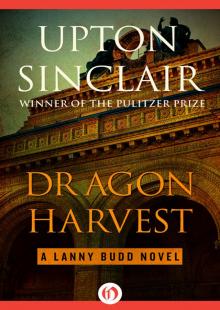 Dragon Harvest
Dragon Harvest The Jungle
The Jungle Sylvia's Marriage
Sylvia's Marriage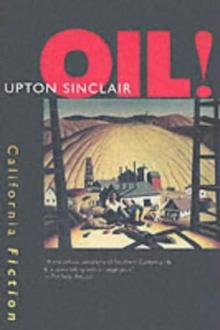 Oil! A Novel by Upton Sinclair
Oil! A Novel by Upton Sinclair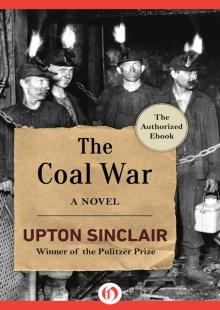 The Coal War: A Novel
The Coal War: A Novel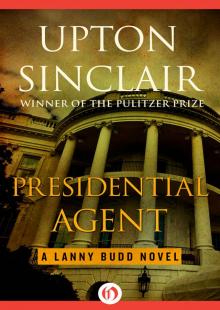 Presidential Agent
Presidential Agent World's End
World's End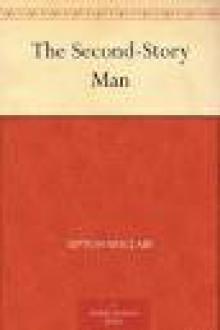 The Second-Story Man
The Second-Story Man O Shepherd, Speak!
O Shepherd, Speak!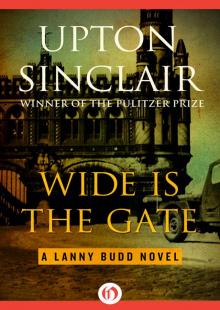 Wide Is the Gate
Wide Is the Gate The Return of Lanny Budd
The Return of Lanny Budd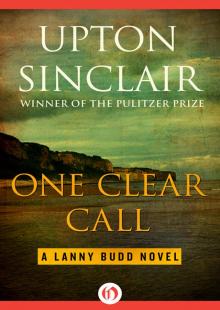 One Clear Call I
One Clear Call I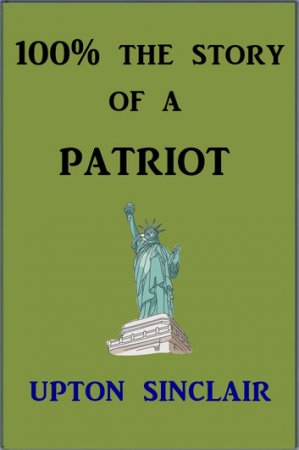 100%: the Story of a Patriot
100%: the Story of a Patriot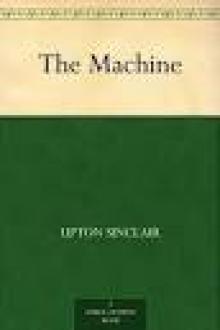 The Machine
The Machine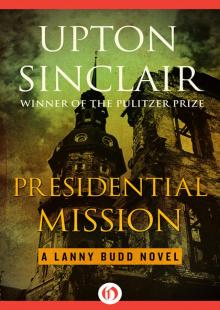 Presidential Mission
Presidential Mission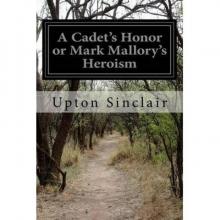 A Cadet's Honor: Mark Mallory's Heroism
A Cadet's Honor: Mark Mallory's Heroism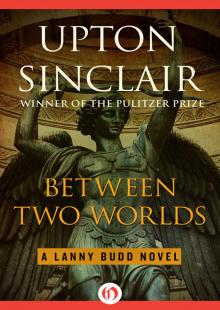 Between Two Worlds
Between Two Worlds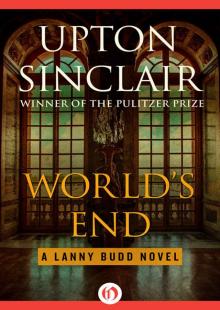 World's End (The Lanny Budd Novels)
World's End (The Lanny Budd Novels)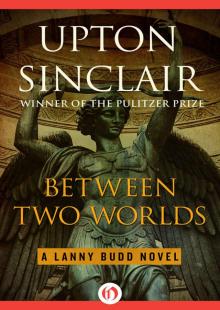 Between Two Worlds (The Lanny Budd Novels)
Between Two Worlds (The Lanny Budd Novels)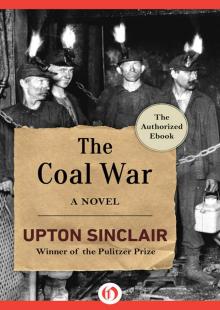 The Coal War
The Coal War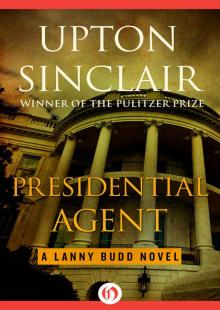 Presidential Agent (The Lanny Budd Novels)
Presidential Agent (The Lanny Budd Novels)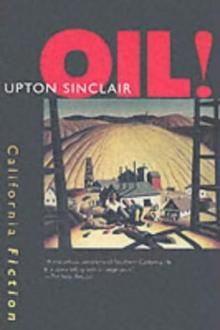 Oil (filmed as There Will Be Blood)
Oil (filmed as There Will Be Blood)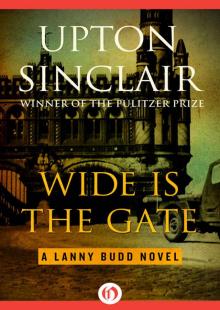 Wide Is the Gate (The Lanny Budd Novels)
Wide Is the Gate (The Lanny Budd Novels)